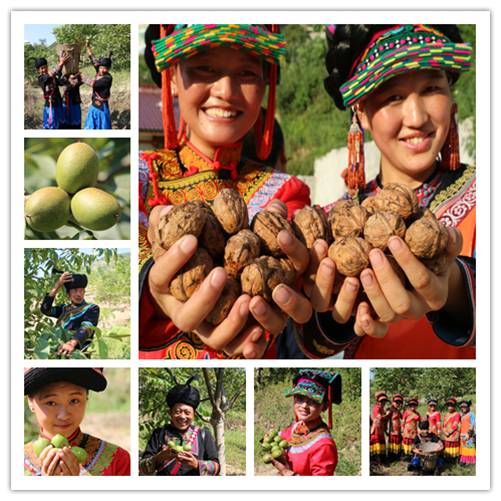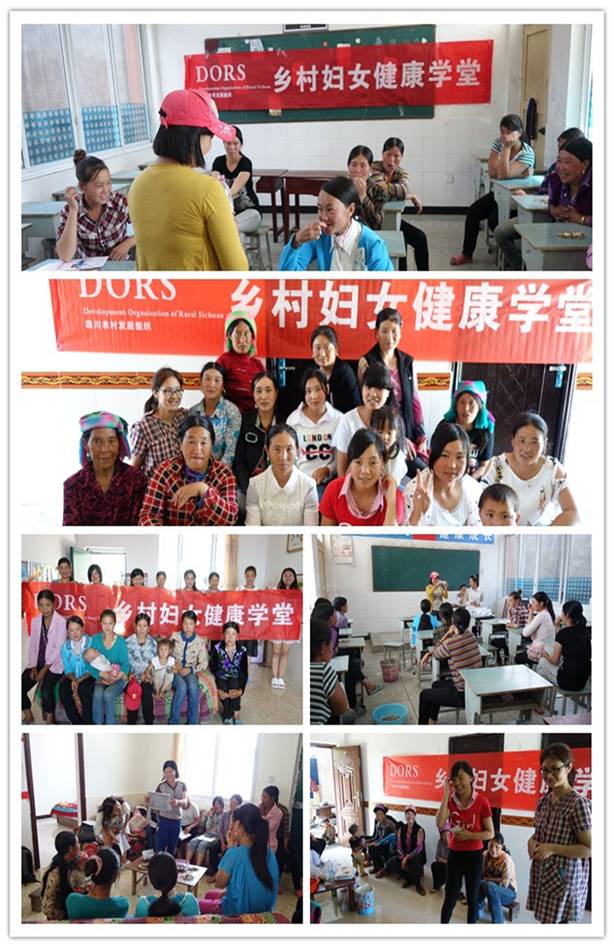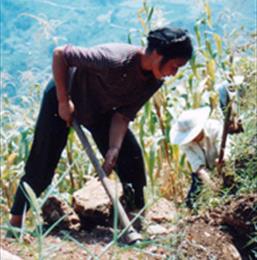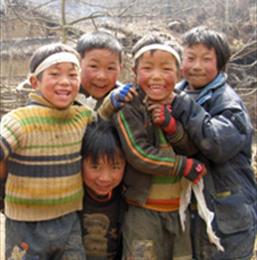Jun / Jul 2016No. 134
31st July 2016
Project Progress
Micro Credit Project
A natural disaster for our borrowers
Time to collect the loan in early July, our loan officer Mr. Bai Shihai informed all the borrowers and made appointments with them. For most cases, they would say: no problem, please come to my home, we will wait for you. But there was an exception: A son of one of our loaners was sick and stayed in Huaxia hospital. The family has spent lots of money but still didn’t have a diagnosis. The problem was that they cannot get the reimbursement from the rural cooperative medical care due to missing the application procedures.
“May I pay back the management fee first and pay back the principle later?” What can we do for those people? Mr. Bai said, “Well, let us come back next month and find a way to help them get through it. Until now, the repayment rate was 100%.
In July, a natural disaster of land collapse due to storm attacked the Hamlet 7 of Chalin Village, a huge boulder hit a villager’s house. The good thing was that all people had moved out of the village, no one was hurt, but the house had collapsed. DORS sent the rescue goods to the village in the first place, and we also informed villagers that they don't have to pay back the loan immediately. These are some of the reasons people from poor villages are usually unable to access loans – natural disasters and paying for unexpected medical fees
Up to 31th July, DORS has provided 56 loans of RMB1,507,000 to Pianma Township and received principal of RMB444,342, management fee of RMB23,828. The repayment rate was 98.1%.

Micro credit needs assessment of Tashan and Daping Community
In July, DORS conducted a needs questionnaires investment of 26 households in Tashan and Daping Communities of Minjian Township in Yingjing County. According to the investment, villagers in these two communities hadn’t applied for any loan from local financial institutions. They borrowed money from their friends or relatives , but without interest. A few of them paid interest which was a principal of RMB10,000 needs to provide RMB1500 fees. Several households in Tashan Community have the credit needs to raise pigs and fish. However, Daping Community didn't have this requirement to use the loan to cpnduct business.

Sustainable Livelihoods Project
Walnut marketing in Pianma Township
With the invitation from Beijing Social resource institute, DORS staff and Daying Villager Mr. LI Xiaolong of Pianma Township attended a workshop of improving villagers marketing ability to “targeted measured for poverty alleviation ”. Over 40 institutes such as Research Center for Rural Economy(RCRE), Heifer International, China Foundation for Poverty Alleviation (CFPA), Greenpeace, SHANSHUI Conversation Center also attended the workshop, all participants discussed the issues of how to improve households marketing ability. After the workshop, Mr. Li Xiaolong went to a local green food market with his walnuts, lots of beijing citizens loved the walnut due to its’ good taste.
In July, DORS accompanied with Beijing Social Resource Institute and Greenpeace visited the JInhui Walnut Plantation Association and Daying Walnut Plantation Association of Pianma Township. They had in-depth discussion with the association managers about the walnut market potentials and hoped to helping villagers to sell their walnut in Beijing by using their new launched e-commerce platform for eco-agricultural products.
DORS has been working to helping people diversify sales routes for agricultural product such as Pianma walnut. We organised villagers to get training, visiting related companies in order to looks for new business opportunities, we also assisted Daying Walnut plantation association to cooperate with local e-commerce company so that to increase their selling channels. We hope the local walnut sales develop to increase villagers’ income.

Relay cropping and raising chicken in the Tea Plantation
Livelihood development is a significant issue to Tashan and Daying Villagers. As these communities have insufficient arable lands, they have to buy cabbages, tomato, vegetable from the market, which is too expensive to them. For most villagers, raising chicken is very easy and normal and good for them to have eggs and meat, however, this is also very difficult for Tashan and Daping Villages as they don’t have enough land. To raise chicken and plant vegetable in the Tea Plantation are the good ways to increase villagers’ foodstuff. We hope this is a good start for local people self-sufficiency.
Energy and Environment Protection
Fuel-efficient Stove project in Daping Community of Minjian Township
After discussion with villagers in June, the 42 households of Daping Community selected their project management team and worked out the implementation plan. With the coordination of the project team and 3 technicians’ hard work, 42 stoves have been built in late July. They await evaluation. All households and the team leader Mr. Li Muzhiha provided large support during the project implementation.
Health Project
Women Health Education of Yingjing County
We conducted 4 sessions of women’s’health education training in Tashan and Daping communities in June. The training covered: infantile diarrhea prevention, how to prevent poisoning by agricultural pesticides, prevention of common diseases in women, transmission and prevention of HIV, prenatal care, prevention of infantile fever and menopausal health care. Women planned the training schedule by themselves which is to avoid the harvest time. We also gave them enough time to practice. For example, we gave them the training materials in advance and guided them how to do the presentation. Most local women trainers were shy to present some of the topics at first, but now they can stand with confidence in front of their audiences.
Kitchen facilities improvement in Daping Community of Yingjing County
In order to improve local peoples’ kitchen facilities, after discussion with villagers, DORS technician designed a kitchen cupboard and washing sink layout according to their needs. DORS also went with the management team to select the materials supplier. The supplier started to produce the cupboard and washing sink according to our design after agreeing the price. The project was going well. In July, DORS project manager, together with technicians, supplier and management team evaluated the 42 households’ kitchen facilities. All villagers were satisfied with the project, and appreciated DORS support. The new kitchen facility provides convenience and hygienic conditions for villagers and keeps the mice and cockroaches away.
Learning/Exchanging/Connecting/Visiting
Law and policy workshop
Chengdu Shuguang Community Development Capacity-Building Center organised a workshop of "law and policy of social association" in June. They invited the director Mr. Liyong from "Philanthropy and NGO Support Center (PNSC) of Tsinghua" to illustrate the newly-launched “Charity Law of the People's Republic of China” and “Law of the People's Republic of China on the Administration of Activities of Overseas Non-Governmental Organizations within the Territory of China”. They also invited the certified public accountant Ms. Zeng Jinghong to provide the non-profit organization financial accounting training. She has rich experience of the accountant theory and practice, and has provided auditing for many social organizations. Shuguang center also held a seminar of “community management”, which gave a platform for participants to discuss and share experiences on community governance. DORS vice-director Ms. Guo Yumei and Financial manager Ms. Sang Lingzhi attended this workshop. Ms. Guo Yumei also shared a DORS project case study with others.
DORS training
Organizations always have to face the issue of staff turnover. In order to keep DORS’ new staff fully informed of our mission and working methods, we conducted some training sessions with our own staff. In July, DORS carried out a “project cycle” study to discuss the problems which may occur during any project procedure and how to solve them. Working methods and procedures are being modified to take account of the changes in the local social development, while DORS tries their best to adapt to the changing needs of the modern charitable world.



